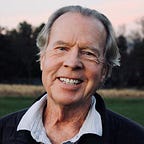Hunting, Fishing and the Law
Much like the opening of Norman Maclean’s A River Runs through It — “In our family, there was no clear line between religion and fly fishing.” — the three most important things in the lives of Lew Kunkel and his father were hunting, fishing, and the law.
After moving to Philadelphia to join the law firm of Pepper, Hamilton (& many other names), as a hunter and a fisherman, Lew was quickly adopted by the usual subjects, Barney Johnston, Dan Pierson, Henry Winsor, and me. His family’s two-hundred-plus acres outside of Harrisburg and his membership in the Texas & Blockhouse Fish and Game Club in Waterville offered us new venues for our passions and made him a valuable addition to our hunting and fishing clan.
As a result, we spent many Saturdays during the fall under Lew’s critical eye, hunting for pheasants at his farm. In 1964, as the pheasant season drew to a close, I received a phone call from Lew. He asked me to join him and Henry Winsor for a hunt that coming Saturday. Then, in a somewhat lawyerly fashion, Lew told me that his father had been murdered the week before while hunting and worried that, if he didn’t go back to the farm before the season ended, he might never be able to return.
During the early morning drive to Harrisburg, Henry and I learned from Lew what had taken place. At sixty-one, his dad, Lewis S. Kunkel Sr. (the former president of the Pennsylvania Bar Association) was not a physically imposing man, although he didn’t suffer fools lightly. On the proceeding Thursday, he’d taken his Brittany spaniel for an early morning outing. As he began to hunt, he came across a young man carrying a single shot shotgun. He told the man that he was trespassing and to leave. Things quickly escalated, and Lew’s dad told the trespasser that he was going to turn him over to the police. With that, the man shot Mr. Kunkel in the left forearm, knocking him down, then reloaded his shotgun, stood over him, and shot him in the chest.
(These details were gleaned from the killer himself. The previous day, he’d been reported shooting a deer out of season. When the police finally caught up with him, he thought somehow they knew that he’d killed Mr. Kunkel and, wracked with guilt, spewed out his confession.)
Once at the farm, Lew, Henry, and I had hunted for less than fifteen minutes when we came to a small area cordoned off by yellow tape. Lew stopped, broke open his shotgun, and stared straight ahead. “This is where Dad was killed.”
Henry and I were silently surveying the scene when a heavy-set man dressed in hunting clothes with a pump-action shotgun propped on his hip appeared behind us. “It’s alright for you boys to keep on hunting,” the man said. “I’ll follow you ’til you’re done.”
The man was Sergeant Pasko from the Pennsylvania State Police. He’d been assigned to look after us because Mr. Kunkel’s killer was a member of a Harrisburg gang, and the police were worried that some gang members might try to settle the score with us.
When we returned to our car for lunch, Lew said that he’d had enough, that he could hunt the farm again next season. He took hold of Henry and me by our arms. “I’ll forever be split down the middle about that little bastard who killed Dad. My heart tells me one thing, but the law tells me another.”
After that last hunt, Henry confided in me that Lew’s ability to contain the rage and insult of his father’s death was inconceivable to him. Lew’s daughter Eliza put it this way: “Dad’s father’s death was a wound he almost always tended to alone. And, my uncle George, who had always been an outgoing and fearless person, never accepted or extended another invitation to visit his old friends after that terrible day. Dad’s distress was not that obvious, but it was ever-present beneath the surface.”
Thirty years later, Lew’s pain surfaced, if only for a brief moment. After a morning of catch-and-release salmon fishing on the Miramichi River, he and I were relaxing in our cabin.
“A great morning,” I said.
Lew nodded. “Dad and I often fished for salmon before he died. That twenty-six pounder would have been the largest either one of us ever caught.” His eyes filled with tears, and he looked away from me. “It would have made him so proud.”
When Henry sent this story to Eliza for her approval before I published it, we were reminded that for the Kunkels it wasn’t only about hunting, fishing, and the law. Eliza wrote: “Wow, Henry! Thanks for sending Harry’s story along. I wasn’t expecting to start sobbing so hard at 8 AM! I’m so grateful you and Harry were there for Lew that day — and so many other days.”
